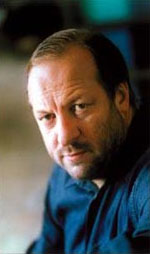Prominent Poles
Zbigniew Preisner (Zbigniew Kowalski, adopted his wife's, a painter Ewa Preisner, surname after their marriage) composer, film music composer.

Born: May 20, 1955, Bielsko-Biala, Poland
Summary. One of the leading film score composers best known for his work with directors Krzysztof Kieślowski. and Agnieszka Holland. He authored “Requiem for my friend”(1998) dedicated to the memory of Krzysztof Kieslowski.
Early days. Preisner studied history and philosophy in Cracow’s Jagiellonian University. Never having received formal music education, he taught himself music by listening and transcribing parts from records.
Life and work. In 1977 he started working Piwnica pod Baranami. This led to his collaboration with Cracow’s Old Theater followed by his first film scores. His compositional style represents a distinctively spare form of tonal neo-Romanticism. Jean Sibelius is an acknowledged influence. Preisner is best known for the music he composed for films by Kieślowski. His Song for the Unification of Europe, based on the Greek text of 1 Corinthians 13, is attributed to a character in Kieślowski's Three Colors: Blue and plays a dominating role in the story. His music for Three Colors: Blue includes a setting of Polish and French versions of a poem by Wisława Szymborska, Poland's Nobel Prize-winning poet. After working with fellow Pole Agnieszka Holland on Kieślowski's Three Colors: Blue, Preisner was hired by producer Francis Ford Coppola to write the score for The Secret Garden, directed by Holland. Although Preisner is most closely associated with Kieślowski, he has written for other directors, winning a César in 1996 for his work on Jean Becker's Elisa. He has won a number of other awards, including another César in 1994 for Three Colors: Red, and the Silver Bear from the 1997 Berlin Film Festival 1997 for The Island on Bird Street. In 1998, Requiem for My Friend, Preisner's first large scale work not written for film, premiered. It was originally intended as a narrative work to be written by Krzysztof Piesiewicz and directed by Kieślowski, but it became a memorial to Kieślowski after the director's death. He composed the theme music for the People's Century, a monumental twenty-six part documentary made jointly in 1994 by the BBC television network in Great Britain and the PBS television network in the United States. He has also worked with director Thomas Vinterberg on the 2003 film It's All About Love and provided orchestration for David Gilmour's 2006 album On An Island. Silence. Night and Dreams is Zbigniew Preisner’s new recording project, a large-scale work for orchestra, choir and soloists, based on texts from the Book of Job. The premier recording, due for release in autumn 2007, will feature the lead singer of Madredeus, Teresa Salgueiro.
Van den Budenmayer Van den Budenmayer is a fictitious eighteenth-century Dutch composer created by Preisner and director Krzysztof Kieslowski for attributions in screenplays. Preisner said Van den Budenmayer is a pseudonym he and Kieslowski invented "because we both loved the Netherlands". Music "by" the Dutch composer plays a role in three Kieslowski films. The first is The Decalogue (1988). The third is Three Colors: Blue (1993) in which a theme from his musique funebres is quoted in the Song for the Unification of Europe. The Song's E minor soprano solo is itself prefigured in an earlier film, The Double Life of Veronique (1991), where circumstances in the story prevent the solo from finishing.
Orchestral works Requiem for my friend (1998), Life (1998)
Music for solo instruments 10 Easy Pieces for Piano (2000)
Film scores (43) Sportsman of the Century (2006);The Beautiful Country (2004); SuperTex (2003); Kolysanka (2003); Strange Gardens (2003); It's All About Love (2003); Between Strangers (2002); Weiser (2001); Aberdeen (2000); Dreaming of Joseph Lees (1999); The Last September (1999); The Island on Bird Street (1997); FairyTale: A True Story (1997); Foolish Heart (1996); Élisa (1995); Feast of July (1995); Three Colors: Red (1994); When a Man Loves a Woman (1994); Three Colors: White (1994); Kouarteto se 4 kiniseis (1994); Mouvements du désir (1994); On the Edge of the Horizon (1993); The Secret Garden (1993); Three Colors: Blue (1993); Damage (1992); Olivier, Olivier (1992); Zwolnieni z zycia (1992); At Play in the Fields of the Lord (1991); The Double Life of Véronique (1991); Eminent Domain (1991); Europa Europa (1990); Ostatni dzwonek (1989); Kocham kino (1988); Dekalog (1988-9); A Short Film About Love (1988); A Short Film About Killing (1988); To Kill a Priest (1988); Ucieczka (1987); The Lullabye (1987); Przez dotyk (1986); Lubie nietoperze (1986); Bez konca (1985); Prognoza pogody (1981).
This article uses, among others, material from the Wikipedia article "Zbigniew Preisner" licensed under the GNU Free Documentation License. :
Wikipedia (in Polish)
Other sources:
Zbigniew Preisner official biography
Zbigniew Preisner filmography (in Polish)
Interview with Zbigniew Preisner
Return to home page:
Prominent Poles
